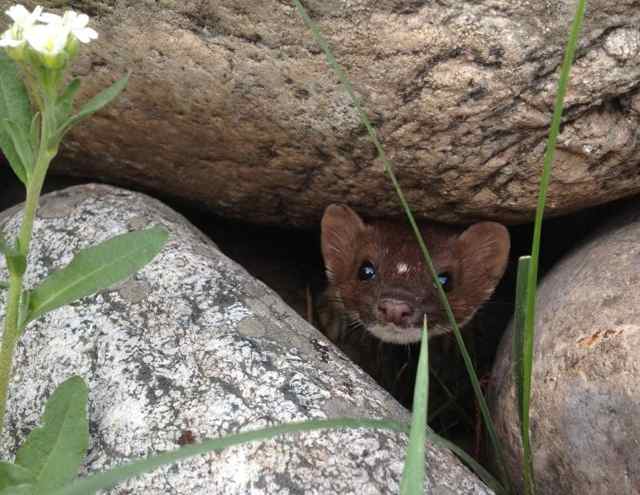
Report Date:
http://www.blue-ribbon-flies.comAt 9,300 feet elevation grouse-berries take until August to ripen. On our trip to the high lakes we stopped along the way to water up at spring seeps and pick tart and tasty pink fruit of the grouse-berry shrub. This dwarf shrub remains green all year long. Dusky grouse enjoy the fruit in season and elk browse the leaves after high elevation snows come in late September covering the short grasses near timberline. I was surprised to find little bear sign along the trail up to the lakes.
We left the trucks at 6600 feet. Nine of us heading up the 3 miles to lunch and fish cutthroat trout at the first lake of 3. The 3 youngest of our group, girls seventeen and eighteen years old, rode horses while the rest of us trudged up the trail. The oldest member of our walking group is eighty, and she roared up the trail keeping up with those many years younger.
It took nearly 3 hours to reach our destination but once we all peaked over the ridge and looked down on the lake all were glad we'd made the hike. Trout rose in the middle of the lake and reflections of nearby mountain peaks mirrored the calm blue water along the shoreline. It almost is not fair how naïve the trout are here for nearly every cast brought one to the fly. After a short time even the beginners of our group became bored with the gorgeous cutts so easily duped and coming to hand. A couple youngsters began swimming the lake, some of us lunched and laid in the sunshine while others hiked to the rocky cliffs hoping to find evidence of Sheepeater Indians that once hunted bighorn sheep in this area. I know because I have found bighorn skulls stuck by the Sheepeaters in the crotches of some whitebark pine trees that are nearby. On our way up the trail we found several chips of obsidian left by the Sheepeaters 600 or more years ago as they worked the rock to fashion arrowheads and spearpoints for their hunting parties. The Madison Valley is rich in native history and we were all glad to be checking out tiny bits and pieces of it on our hike and while we fished cutthroat trout.
Around 2 p.m. the winds kicked up as clouds rolled in, thunder roared and lightening bounced off mountain peaks on the west side of the valley, ten or more miles across the Madison River from us. We packed up or gear, rigged the horses and loaded up for the trip back down the mountain. On the way down we noted a fire start from a lightening strike near Cave and Granite Mountains. Later we found the fire to be in Eureka Basin and today it still burns at over 200 acres with a crew of 70 fire fighters on it. Never a dull moment in Yellowstone country for sure!
This morning the sun showed reddish-orange as it rose over Hilgard Peak to the east. It is a hazy morning here in the valley, common for this time of year with the usual August smoke, dust and pollen in the air. I'm reminded of past Augusts and fine terrestrial action on our rivers and streams as well as lakes. August also means kids back in school, the first big run-up trout coming into the Madison River from Hebgen Lake, snowberry bushes laden with their white fruit, great gulper fishing on our lakes, West Yellowstone's Crazy Days and the first bull elk bugling as they gather their harems.